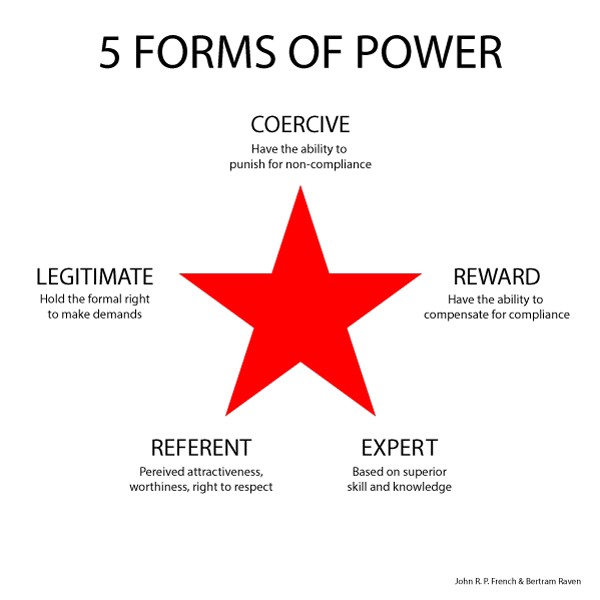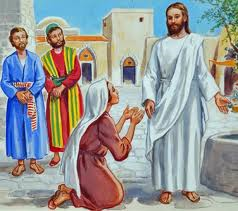Click here to return to Blog Post Intro
Understanding Your Sources of Power
 Leaders must develop expertise using all five types of power (pictured here: reward, coercive, expert, referent, and legitimate), but the ability to use the other four is enhanced or diminished by how the followers think and feel about the leader as a person. Referent power drives or cripples the other four.
Leaders must develop expertise using all five types of power (pictured here: reward, coercive, expert, referent, and legitimate), but the ability to use the other four is enhanced or diminished by how the followers think and feel about the leader as a person. Referent power drives or cripples the other four.
In fact, Richard Daft in The Leadership Experience explains referent power as the “kind of power that comes from the leader’s personality characteristics that command the followers’ identification, respect, and admiration so they want to emulate the leader.” Daft further writes, “Referent power depends on the leader’s personal characteristics rather than on a formal title or position.” Do you have the respect and have you earned the loyalty of your followers? That’s what Referent Power is all about…
What the Old Testament Says about Using Power
In Psalm 82:3-4, God challenges the judges and rulers of Israel to “defend the weak and fatherless” and to protect the rights of the “poor and the oppressed.” They were to exercise their power in a godly manner—a manner that would rescue the needy and deliver them from the dominion of wicked individuals.
This theme is echoed across the Old Testament. In another reading this week, Obadiah (like many Old Testament Prophets) railed against the improper use of power in Obadiah 8-14. He—like King David in the Psalms—urged followers to protect of the powerless.
Unfortunately, in the book of Daniel, we see that the emperor of Babylon didn’t follow that advice. King Nebuchadnezzar enjoyed years of dazzling military and economic achievements, amassing power. But like so many other influential leaders who preceded and followed him, he fell prey to the illusion that he accomplished these things…and he failed to give credit to God.
While Daniel advised him to use his positional power in service of others through acts of kindness, he refused. As a result, he lost his kingdom.
Fortunately, God restores. In Daniel 4:34-37, King Nebuchadnezzar turned to God…who restored him to his throne, and he became even greater than he was before. Nebuchadnezzar glorifies God, recognizing that God’s ways are just. He points out that those who walk in pride, God is able to humble.
A Mother’s Request…and Jesus’ Perspective of Power

In Matthew 20:20-23, the mother of Zebedee’s sons (James and John) asked Jesus, “Grant that one of these two sons of mine may sit at your right and the other at your left in your kingdom.” Jesus responded that was “not for him to grant.” He went on to explain in Matthew 20:26-28, “Whoever wants to become great among you must be your servant, and whoever wants to be the first must be your slave—just as the Son of Man did not come to be served, but to serve, and to give his life as a ransom for many.” This is one of the most profound statements ever made about the effective use of power, authority, influence, and position.
Why do you want power? Some leaders expend their lives in a quest to compete against and dominate others to acquire, then defend, their positions of power. But Jesus implied there is only one correct answer to that question: “I want power and influence because with it, I can better serve God, people, and this organization.” Anything less than that response violates God’s trust in you as one who has been granted power…
As leaders, we need to recognize that God never bestows positional and personal power as an end in itself but always as a trust to be exercised with stewardship for the benefit of others.
Earlier this week, I heard a great example of this from Kevin Durant, when he accepted the National Basketball Association’s 2014 Most Valuable Player Award. If you haven’t heard his speech, it’s guaranteed to make you tear up! Here’s a link to a 7-minute version of the 27-minute speech. In the first 40 seconds, he shows a good perspective of “positional power”…and in the last 2 minutes (minute 5 to minute 7), he has a special word for his mom. Check it out, and we’ll give KD the last word today –
